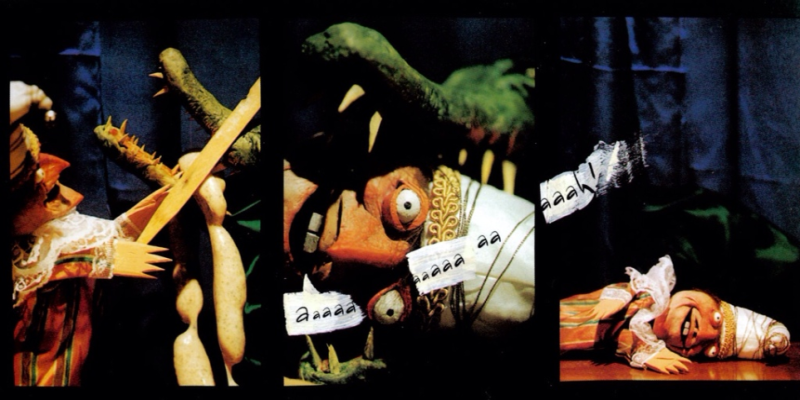Ful of the Moon Ful of the Moon,
Ful of the Moon nor dont look back
Folleree Folleroo on your track
Oo hoo hoo Yoop yaroo
Folleree Folleroo follering you
If they catch you in the darga,
Arga Warga
Reading Riddley Walker has been one of the most profound and moving experiences I’ve ever had with literature. Every sentence and every word stuck to me, and I couldn’t help but want to get lost in the corrupted language.
Some 2347 years, give or take, after a nuclear holocaust has wiped out our present civilization, the world’s been stagnating in its earliest stages. Riddley Walker‘s is a text written by its eponymous connexion man after his naming day (i.e., 12th birthday), which means the text is written in a form of English quite transformed from our own. His short-lived role of connexion man ties him as a go-between to the ruling elite of the local Inland and Eusa folk. In a dead world with no electricity, communications, methods of transportation, science, literature, &c., he’s trained to translate the Mincery’s (‘Ministry’) puppet renditions of Punch & Pooty (‘Judy’) shows and the teachings of Eusa (‘St. Eustace,’ taken from the Cambry (‘Canterbury’) cathedral).

Eusa’s dynamic teachings are the foundation for moral authority across the Inland (present-day Kent). He was, once upon a time, a religious martyr responsible for the 1 Big 1 — tricked by the devil (‘Mr Clevver’) into splitting the atom (‘Little Shynin Man the Addom’) and causing the final holocaust. His head is spoken of as still speaking law at the mysterious island of Ram, where the ruling elite presumably live and dole out the Mincery’s law through puppet theater. His guilt is a guilt of a society driven by knowledge and power to be self-destructive, and it’s a guilt carried by the Eusa folk of Riddley’s time. Like many religious followers, the Eusa folk carry the suffering of Eusa in both physical and psychological mutations — their emotions form a telepathic connection between one another, and often packs of wild dogs. Riddley, as part of his connexion duties, has one version of Eusa’s Story and its core teachings memorized. The memorized text he uses for his work reflects modern religions: Its teachings were written long after the existence of Eusa, but centuries before Riddley Walker recites them, and the language itself is slightly less corrupted compared to the language the current Inlanders speak.
Punch & Judy pop up with significant influence throughout the book. At times, the creepy rebelliousness of Mr Punch is literally channeled through Riddley, who carries a pre-war, rotten Punch doll as a charm. For the central conflict, we even get a full performance of Punch & Judy mythologized for the people of the Inland. (Despite its unoriginality, that ranks among my favorite passages from any novel. I highly recommend those unfamiliar to give Neil Gaiman’s Tragical Comedy or Comical Tragedy of Mr Punch a look-see first. I’d wager his creepy graphic novel knowingly takes a lot from Hoban’s use of the doll.)

Riddley Walker’s difficult at times, but is balanced enough between catchy lyricism and a Joycean nightmare that its messy style is more a boon than a distraction. Even though the language is of its own world, its vocabulary is as limited as the culture employing it. Keeping it simple, then, Hoban has riddled the language with as many layers and allusions as he could. You still have to slow down, but at least you’ll want to — and ain’t that a clear sign of great writing if ever there was one! (Indeed, the 1998 edition features an afterword by the author, with a sample from his first draft written in standard English. It carries little of the published novel’s weight.)
While some guiding themes are built from typical Cold War fears, they’re written in a way that effects a timelessness in this new mythology Hoban created. The corruption of language, and mythopoeic reconstruction of a moral belief system in this future Dark Age keeps Walker’s text from feeling dated by Cold War ideology and its technological trappings. E.g., the Inland’s folklore is often peppered with broken references to science and technology, but the backwards, ’70s understanding of it benefits the backwards state of the Inland society. Puter Leat is Computer Elite; Belnot Phist is Nobel Physicist; 1stoan Phist is Einstein Physicist; and — a favorite — the sovereign galaxies and nebulae above are the sarvering gallack seas and flaming nebyul eye.
Knowledge is the currency of power in the Inland, particularly the lost knowledge of the industrial age. This is probably why no one ever seems to be headed anywhere in Riddley Walker: They’re fighting to take Eusa’s very steps and split the Little Shynin Man once again, taking equal movements forward and back with each Ful of the Moon. Rough world, but I really wanna go back.
★★★★★
Arga Warga.

